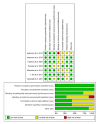The Effect of Angiotensin II Receptor Blockers in Patients with Hypertrophic Cardiomyopathy: An Updated Systematic Review and Meta-analysis of Randomized Controlled Trials
- PMID: 39076239
- PMCID: PMC11273854
- DOI: 10.31083/j.rcm2304141
The Effect of Angiotensin II Receptor Blockers in Patients with Hypertrophic Cardiomyopathy: An Updated Systematic Review and Meta-analysis of Randomized Controlled Trials
Abstract
Background: Angiotensin receptor blocker (ARB) therapy has been evaluated to slow down the disease progression in patients with hypertrophic cardiomyopathy (HCM), but there is scarce evidence available to date. Therefore, our meta-analysis aimed to explore the efficacy of ARB therapy as a potential disease-modifying treatment in patients with HCM.
Methods: A literature search was performed using PubMed, Scopus, Web of Science, Embase, Cochrane library, and Clinicaltrials.gov databases from inception to December 13th, 2021. We included only randomized controlled trials (RCTs). The quality of included studies was assessed by the Cochrane Collaboration's tool. Primary outcomes included the reduction in left ventricular mass and improvement in other echocardiographic features of myocardial dysfunction. The secondary outcome was a net reduction in systolic blood pressure. Meta-analysis was performed using pooled standardized mean difference (SMD) and corresponding 95% confidence interval (CI).
Results: A total of 1286 articles were screened. Seven RCTs met the inclusion criteria representing a total of 397 patients with HCM (195 patients were in the ARB group). ARB treatment was associated with significant reduction in left ventricular mass (SMD: -0.77; 95% CI: -1.40, -0.03; p = 0.04). ARB therapy was also associated with a significant reduction in systolic blood pressure (SMD: -0.33; 95% CI: -0.61, -0.05: p = 0.02).
Conclusions: ARB therapy is associated with a marked reduction in left ventricular mass and systolic blood pressure in patients with hypertrophic cardiomyopathy. We recommend further studies with a larger patient population size to confirm the findings of our meta-analysis.
Clinical trial registration: OSF Registries, DOI: 10.17605/OSF.IO/DAS7C.
Keywords: angiotensin II receptor blockers; hypertrophic cardiomyopathy; left ventricular mass; meta-analysis; systematic review; systolic blood pressure.
Copyright: © 2022 The Author(s). Published by IMR Press.
Conflict of interest statement
The authors declare no conflict of interest.
Figures




References
-
- Geske JB, Ommen SR, Gersh BJ. Hypertrophic Cardiomyopathy. JACC: Heart Failure . 2018;6:364–375. - PubMed
-
- Maron BJ, Gardin JM, Flack JM, Gidding SS, Kurosaki TT, Bild DE. Prevalence of Hypertrophic Cardiomyopathy in a General Population of Young Adults. Circulation . 1995;92:785–789. - PubMed
-
- Harmon KG, Asif IM, Klossner D, Drezner JA. Incidence of Sudden Cardiac Death in National Collegiate Athletic Association Athletes. Circulation . 2011;123:1594–1600. - PubMed
Publication types
LinkOut - more resources
Full Text Sources
Miscellaneous

